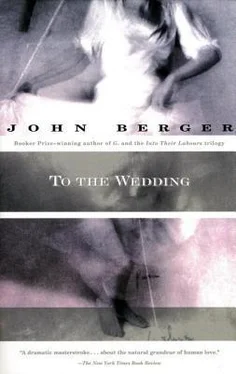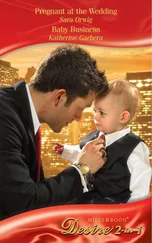John Berger - To the Wedding
Здесь есть возможность читать онлайн «John Berger - To the Wedding» весь текст электронной книги совершенно бесплатно (целиком полную версию без сокращений). В некоторых случаях можно слушать аудио, скачать через торрент в формате fb2 и присутствует краткое содержание. Год выпуска: 2011, ISBN: 2011, Издательство: Knopf Doubleday Publishing Group, Жанр: Современная проза, на английском языке. Описание произведения, (предисловие) а так же отзывы посетителей доступны на портале библиотеки ЛибКат.
- Название:To the Wedding
- Автор:
- Издательство:Knopf Doubleday Publishing Group
- Жанр:
- Год:2011
- ISBN:978-0-307-79420-8
- Рейтинг книги:3 / 5. Голосов: 1
-
Избранное:Добавить в избранное
- Отзывы:
-
Ваша оценка:
- 60
- 1
- 2
- 3
- 4
- 5
To the Wedding: краткое содержание, описание и аннотация
Предлагаем к чтению аннотацию, описание, краткое содержание или предисловие (зависит от того, что написал сам автор книги «To the Wedding»). Если вы не нашли необходимую информацию о книге — напишите в комментариях, мы постараемся отыскать её.
To the Wedding — читать онлайн бесплатно полную книгу (весь текст) целиком
Ниже представлен текст книги, разбитый по страницам. Система сохранения места последней прочитанной страницы, позволяет с удобством читать онлайн бесплатно книгу «To the Wedding», без необходимости каждый раз заново искать на чём Вы остановились. Поставьте закладку, и сможете в любой момент перейти на страницу, на которой закончили чтение.
Интервал:
Закладка:
I’m watching the pyramids upside down. Papa, can you hear me? I’m twenty-four and I’m going to die.
When the signalman crosses the Po at San Sebastiano, where the river is already larger than a village is long, he drives slowly with only one hand. There is no vehicle in front of him.
I phone Marella and I ask her to come round. I have to talk. I tell her what’s happened. Christ! she says.

After he has crossed the bridge, the signalman stops, puts both feet down and looks up at the sky, his arms hanging limp.
This morning when I woke up I didn’t remember. For a few seconds. For a few seconds I forgot. I didn’t remember. Dear God.
The signalman grips the grips, revs and taps down into first.
I have a rendezvous with Gino in Verona and I shan’t go. No. Never.
The signalman has disappeared behind a reed bank, driving fast now, as if he has changed his mind about something.
Listen, Marella, this is what Gino writes in a letter which came this morning: I’m wearing the T-shirt with Vialli on it, he writes, because you said he was your favourite footballer. Shall we go to the sea together on Tuesday? I see you all the time, Ninon. I set up shop in the Piazza Marconi and I see you on the far side of the crowd. I’m in Parma and you’re in Modena and I see you four or five times in a day. I recognise your elbow, and the way you slip your arm through the strap of your white bag and the Chinese crumpled silk dress you wear with orangey flames on the left hip. I see you because you’ve got under my skin. Yesterday, Sunday, I sold forty-three Ricci shirts. A good day. About a million and a half profit. A whole summer month like this, I was telling myself, and we’ll go and buy, Ninon and I, air tickets to Paris. I love you. — Gino. I tore up the letter, Marella, and I flushed it down the lavatory. It wouldn’t disappear the first time. The paper floated.
The road passes between two large farms, each with its yard, its gate and its square buildings. Outside the towns, every habitation on this plain is built square so as to resist a little the endless space which dwarfs everything. When the signalman and his bike have passed, the two large farms are silent.
I’m on a trolley, Papa, and they’re wheeling me somewhere down a corridor, two men in white, who are thinking about something else, not about me. Where are you taking me? I ask. To the Endocrinology Unit, one of them says kindly. I don’t understand. It’s a detail, anyway, and on a trolley like this, with wheels which turn in every direction, I’m going to be wheeled out.
In the village of Crescentino a funeral procession winds its way from the church and the signalman is obliged to follow as slowly as the last rank of mourners, men in hats who walk with their heads bowed.
Marella phones. She isn’t weeping any more, so I don’t either. Let’s not call it SIDA, she says, between you and me, just between you and me, let’s call it STELLA.
Nothing hides like flatness. On the plain the signalman is riding across, a man doesn’t know about last night’s violence until he trips over the body.
Marella, I have another letter from Gino: Ninon, it says, Ninon, I understand nothing. You stand me up. You give back the turtle ring. You drop it in my letterbox without a word. You come all the way to Cremona and you don’t see me. I don’t even know when you’ll get this letter. But I’m going to find you and I’m going to love you. One morning, wherever you are, you’ll wake up and you’ll see my Mercedes with VESTITI SCIC written on its sides outside your front door. And that morning, you’d better get back into bed. NINON + GINO = AMORE.
This one I don’t tear up. I reply to him on a postcard which I put in an envelope. On the postcard I tell Gino he must have a test to see whether he’s seropositive. I say nothing about myself because there’s nothing to be said. It’s obvious. The postcard is of Vialli, scoring.
The signalman is now crossing paddy-fields which extend to the horizon and which shine like a hundred irregular mirrors. On their surface is a green filigrane made of the shoots of the early rice crop. The rice fields were a part of a dream of Cavour’s in which he saw Italy become a rich country. A canal was built for the rice fields. And here, in 1870, the first long, smooth, milky, light Italian rice, which melts in the mouth like no other, was picked and dried and poured into sacks.
I have nothing. All, all, all, all, all I had has been taken.

Nothing moves on the still water. The irregular mirrors reflect the light from the sky. No colours. No clouds. Only the signalman on his bike moves. He is driving very fast.
The gift of giving myself has been taken away. If I offer myself, I offer death. Always, till my dying day. When I walk down the street and the ragazzi look at me, I’m reminded how all the while I’m death. Come close enough to me, once, twice or a hundred times and, supposing I love you, you will die. Not if you use a condom, they say. With a condom there’s latex rubber between you and your death, and latex rubber between you and me. Latex solitude. Latex solitude for ever and ever. Nothing can touch any more.
He crosses the silver water, barely reducing his speed when he corners, moving like mercury, seldom upright, often inclined as though listening to the earth, first on one side and then the other, bending over to listen with pity.

All I had to offer, old as the world, God-given, balm for pain, honey for taste-buds, promise for always, silken welcomes, oh to welcome, to welcome, knees turned on their sides, toes extended — all I had has been taken.
There are no walls, no banks or rocks to throw back the sound of the engine, and so for the signalman the noise of his motor is inaudible. He hears only the noise of rushing air — as in a whorled seashell when one puts it to the ear. The faster he drives the louder the rush. And in this shaking, buffeting slipstream fly the voices.
I had to send two photos of myself, a Xerox of my identity card and an electricity bill to prove where I lived.
I too at your pitiful fate, says Euripides, shall spend my sad life in tears.
Then came a letter informing me that my request had been granted and I should present myself at 3 p.m. on Thursday at the Maison d’Arrêt in Nantes.

The signalman’s road goes through a copse of willows. The tree from which Orpheus took a sprig when he went to find Eurydice: the tree whose bark contains salicin, which works as a pain-killer like aspirin.
I found the prison in a narrow street on a hill, about half an hour’s walk from the station.
I ordered a coffee and a sandwich in the nearest bar. I wasn’t sure what I would do when I faced him. How I knew it was him, I couldn’t explain to anybody. All the lab tests I’d gone through were one thing; my body had its own lab, and the results from this lab told me conclusively it was him. It was him and I wanted him to see me, me the one whose life he had ended. There’s no blemish on me yet, and so if he sees me now, he’ll know what he has done and he’ll know the enormity of it. Then I’m going to kill him.
In the prison, two women warders seize my handbag, frisk me and force me to turn round in circles. A dickie takes my papers.
The Cook’s blue eyes, his cropped hair, his knuckles have not changed. He’s thinner. The way he is sitting is twisted, and his feet are bigger than ever. I hate him. What does the bastard remember as he watches me approach? His smile is false.
Читать дальшеИнтервал:
Закладка:
Похожие книги на «To the Wedding»
Представляем Вашему вниманию похожие книги на «To the Wedding» списком для выбора. Мы отобрали схожую по названию и смыслу литературу в надежде предоставить читателям больше вариантов отыскать новые, интересные, ещё непрочитанные произведения.
Обсуждение, отзывы о книге «To the Wedding» и просто собственные мнения читателей. Оставьте ваши комментарии, напишите, что Вы думаете о произведении, его смысле или главных героях. Укажите что конкретно понравилось, а что нет, и почему Вы так считаете.












